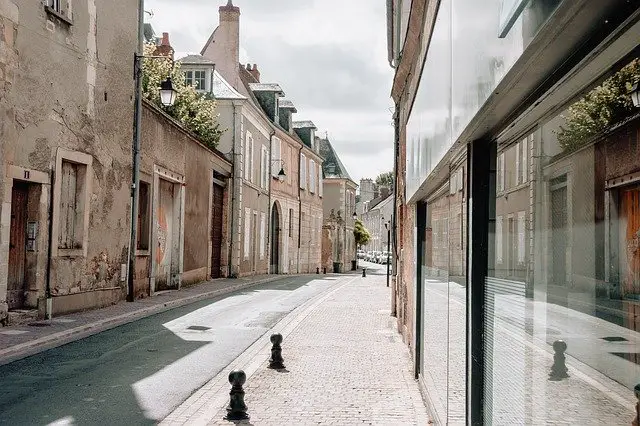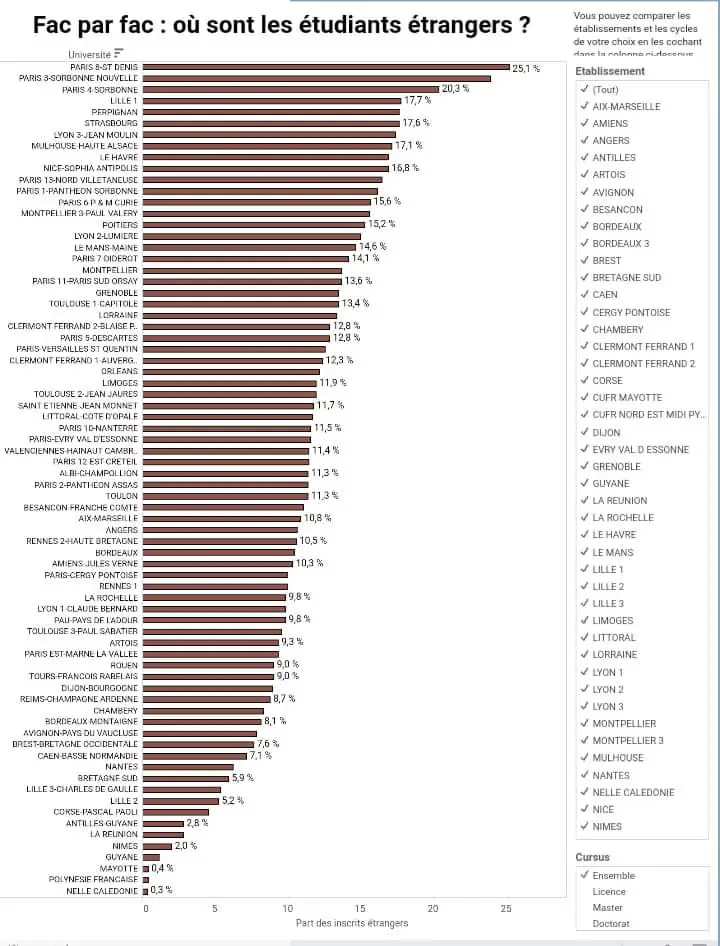Finding the least (or not) selective universities in France is not an easy task. There is indeed no ‘official’ ranking that differentiates them from the so-called more selective ones. Nevertheless, here are some clues that may provide an idea of those who, potentially, most easily accept foreign students within its campuses.
We will focus in particular on some international rankings that take into account access to scholarships, the success rate in studies, and post-studies opportunities (easy access to employment). Also, will be taken into account, some more academic criteria such as performance in scientific research and the availability of experimental means (labs, equipment, etc.).
Being a less selective university often means being more or less badly classified in the mentioned rankings. Nevertheless, things are not that black and white and should be taken with a grain of salt.
Selective university or not?
First of all, it should be noted that this very concept of selectivity has no objective meaning. At least not as it may be believed to be by foreign students who are trying to continue their higher education in France.
Even if we can understand what do they mean by “non-selective universities “, the fact remains that it is important to know that this depends on several distinct elements. Some universities can be both selective and non-selective at the same time !
It is also recommended to avoid relying on information conveyed by word of mouth or forums, because it is often imprecise and can very easily be misleading. Therefore, it would be better to concentrate on those which are sourced and coming from official platforms like Diplomatie-gouv .
Everything is about specialization
We often hear Campussians (those who have already taken Campus France procedures) giving different, even contradictory, opinions on the same university . Some will say that it is very selective while others will always classify it with the so–called non-selective ones .
The explanation resides in the fact that within the same university, a program (specialty) offered in a given field can be very demanding towards foreigners because of high deman, while others fields that are not very coveted, accept almost all those who apply.
Not forgetting that in the end, the main goal of a university (the department) is to fill those specialties that are of little interest to French people. They, therefore, accept all foreigners who are lucky enough to come across one of them… within the limit of available positions of course.
Choose with consistency
We can very easily and intuitively, guess whether a specialty is likely to be selective or not. The main criterion for this is “employability” after the end of the training. Studies that do not offer many professional opportunities are often shunned by students.
This makes them more easily accessible to foreign students, even if they may present a problem afterwards for the job search (less chance to remain in France after studies). Fortunately, this problem can be easily overcome by simply changing the field of study once in France (after one year of study).
Also, one should not underestimate the importance of the coherence of the application which can be mean to the applicant a refusal of a long stay visa (because of a failed interview), even if the university garantees him a sit. For example, it is not accepted (nor logical) to apply for a course in “History of Eastern Civilizations” when one has studied many years of “civil engineering” ( refusal of visa reason 4 ) .
The least selective specialties
Among the least selective specialties (in any university) we can find those dealing with fundamental science, a niche field (obsolete), or some abstract knowledge. In general, these are related to the following areas :
- Mathematics
- Theoretical physics
- Philosophy
- Zoology (animals)
- History and civilizations
- Agronomy (niche specialties)
- Etc…
The 35 least selective French universities
As mentionned before, the least selective French universities are generally those which attract locals the least. They are often far from urban centers and are sometimes even in the overseas departments .
Note that to establish the following list of French universities which are likely to accept foreign students more easily, we took as a basis rankings which take into account several criteria , the most important of which are the relatively low success rate and a lower performance in scientific research .

The non-exhaustive list of the 35 less selective french universities
Here is the list of French universities generally considered as non-selective (even this strongly depends on the chosen specialty), so we have from the least selective to the most selective :
- French Polynesia University
- University of Guyana
- INU Champollion
- Coastal Opal Coast University (ULCO)
- University of Corsica – Pascal Paoli
- University of Nîmes
- University of Artois
- University of Reims Champagne-Ardenne
- University of Perpignan Via Domitia
- University of Reunion
- Avignon University
- University of Toulon
- Rennes 2 University
- University of Picardy Jules Verne
- University of Pau and the Pays de l’Adour (UPPA)
- Sorbonne New Paris 3 University
- University of South Brittany (UBS)
- University of Orleans
- Vincennes-Saint Denis University (Paris 8)
- Toulouse Jean Jaurès University
- University of Rouen
- University of Franche-Comté
- Bordeaux Montaigne University
- University of Haute Alsace – UHA
- Savoie Mont-Blanc University
- University of Western Brittany (UBO)
- University of Le Havre
- Paul Valéry University – Montpellier 3
- Hauts-de-France Polytechnic University
- University of Tours
- University of Caen Normandie
- University of Clermont Auvergne (UCA)
- UVSQ University of Versailles Saint-Quentin-en-Yvelines
- University of Evry-Val d’Essonne
- University of Angers
French universities with the most foreign students
There is also another ranking that is interesting to analyze, that is the one of the percentage of foreign students in certain French universities.
The results we can see can be explained by the fact that the majority of foreign students prefer to go to more selective faculties, provided they are located in large urban centers. The reason for this is that it is very difficult to find a student job in small towns.
The choice of faculties during the Campus France procedure should therefore not be made exclusively in relation to selectivity, but it must also take into account the economic viability of the whole study in France project.

Important to know
There is no point in applying to a university that is in a city (or place) where the student does not have accommodation. It is thus necessary to think of insuring that before applying for a visa to avoid a refusal for reason 5 .
As for CROUS accommodation, they are often quickly taken by the earliest arriving students and above all, are generally reserved for graduate students (PhD, Engineering, Masters, etc.)
